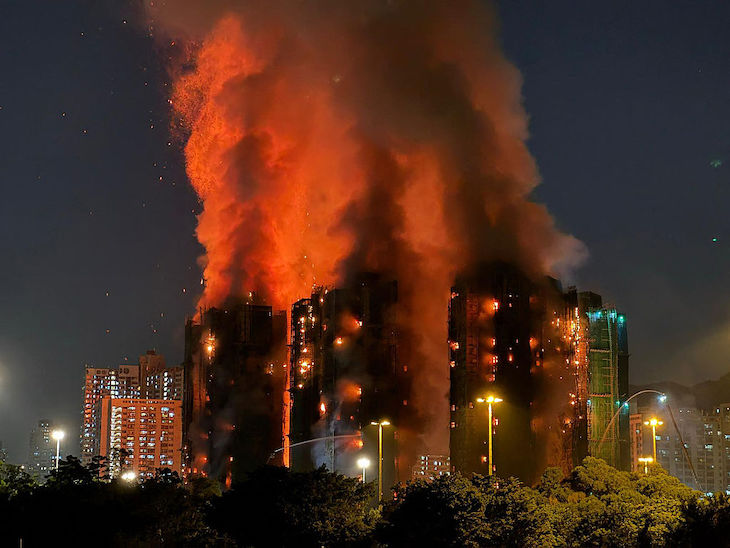Hong Kong is reeling from the tragedy of a devastating fire which ripped through seven 30-storey apartment blocks in a crowded housing estate two days ago. The death toll so far is 128 and still rising. At least 76 have been injured and almost 300 are missing. Stories abound of survivors trapped in flames and smoke.
The death toll so far is 128 and still rising. At least 76 have been injured
As is so often the case in such tragedies, the emergency services responded with inspirational courage. Firefighters battled the blaze for hours, medics treated the injured, and rescue workers pulled survivors from smoke-filled stairwells. At least one firefighter has died. Throughout Hong Kong, local residents have rallied to help, providing donations and organising human chains to distribute food and supplies for the victims.
The densely-populated Wang Fuk Court estate in Tai Po is home to at least 4,600 people. The fire was sparked during renovations, when highly flammable green mesh netting and polystyrene foam boards caught alight. Strong winds soon spread the flames across tower blocks. According to preliminary investigations, ‘firefighters suspected that the netting, mesh, canvas and plastic sheeting installed on the buildings did not meet fire safety requirements.’
This is Hong Kong’s Grenfell. The parallels with the tragic fire in London’s Grenfell Tower in 2017 are stark. And it begs the question: why were such dangerous materials being used on high-rise tower blocks without adequate firebreaks?
While the immediate cause appears to be the flammable netting and polystyrene foam boards catching alight, a broader factor that appears to have contributed to this tragedy is the lack of transparency and accountability. So who should be held accountable, and how can accountability be ensured?
Yesterday three men were arrested on suspicion of negligence leading to manslaughter. They include directors of the construction company, and a consultant. Police senior Superintendent Eileen Chung said that: ‘Preliminary investigations reveal that [the Styrofoam boards] were installed by a construction company during the repair work. Police have reason to believe that the company’s directors were involved in serious negligence that caused the fire and its rapid spread.’
This is a start. But what will be needed is a full and transparent inquiry, a forensic analysis of materials and breaches fire safety standards. It is already alleged that fire alarms failed to activate and emergency systems did not work. The use of flammable netting, if confirmed, would also be a clear breach of Hong Kong’s regulations. In the weeks leading up to the blaze, residents reported seeing construction workers smoking on the scaffolding. How was this allowed to happen?
A tragedy like this is first and foremost a human one and should not be politicised. Nevertheless, fires resulting from negligence inevitably become political. One only has to remember the tensions Theresa May’s government faced in the immediate aftermath of Grenfell. And it should not be forgotten that mass protests which became known as the ‘White Paper’ movement spread across China three years ago after ten people died in a fire in an apartment block in Urumqi. They had been prevented from escaping the blaze by the regime’s draconian Covid-19 restrictions.
So this will be a test for Beijing and its proxy regime in Hong Kong. The regime has spent the past six years focused on implementing a crackdown on dissent, ripping up basic freedoms, human rights, the rule of law and autonomy promised in an international treaty, the Sino-British Joint Declaration, instead of investing in infrastructure and the welfare of local residents.
Disasters like these bring to the fore the tensions that simmer beneath the surface. If public anger cannot be expressed through free speech and peaceful protest – both now criminalised under Hong Kong’s repressive national security laws – in what ways might Hong Kongers seek accountability?
Democracies are far from perfect, and do not always handle tragedies like this well. The use of dangerous materials and the lack of adequate fire safety measures are not mistakes exclusive to authoritarian regimes, as we know all too well from Grenfell. But nevertheless, in an open, democratic society the truth can be sought, those responsible can be held accountable, and justice can be found. Independent inquiries, audits of regulations and victim compensation funds are just some of the measures that could be applied. In a repressive police state, accountability is much more elusive. But if Hong Kong is to honour the victims and the bereaved, these are the steps it must take. In the midst of tragedy, as they have shown so often before, the spirit of Hong Kongers will endure, demanding change to prevent future disasters.






Comments